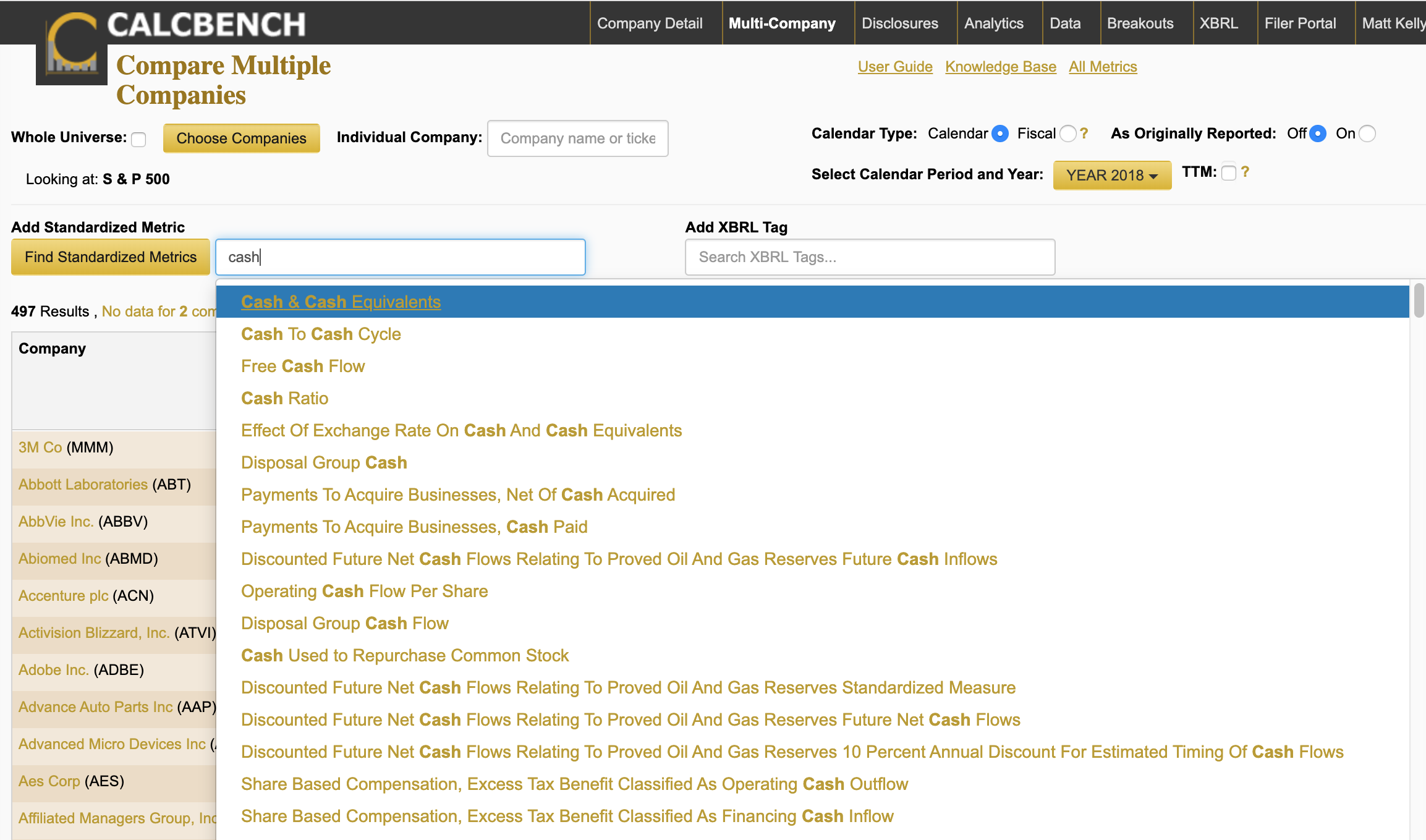We saw an interesting item on MarketWatch the other day that might make the financial analyst’s heart go pitter-patter: Starbucks ($SBUX) warned investors that 2020 profit growth will be lower than expected, because the company is spending more money now on share repurchase programs.
As financial disclosures go, this one was rather quirky. Because Starbucks’ share price has been accelerating so rapidly this year, the company decided to spend more money now on its repurchase program — fearing that shares will be even more expensive in the future. So that cash won’t be there in 2020, so profit growth on an earnings per share basis will be lower.
That’s one way to be a victim of your own success. So how could Calcbench help you identify firms that might face a similar predicament?
One place to start is by studying which firms have large piles of cash relative to total assets. That’s easy to do. Go to our Multi-Company database and select the company or companies you want to research. By default, one of the financial categories displayed will be assets. You can then add cash as another column by typing that into the standardized metrics field on the left side of the page. (See Figure 1, below.)

You could then download that data into Excel, divide cash into total assets, and get a sense of which firms have a relatively large amount of cash available. They’d be logical candidates for share buyback programs.
You’d still want to research whether those firms also have other obligations, such as an upcoming debt payment or other liabilities. Fundamentally, however, you want to start by finding firms that have a lot of money tucked away. This is how you’d do that in Calcbench.
One you have those firms identified, you’d need to study which ones have had large (some might say unwarranted) run-ups in share price. That makes shares more expensive, so companies would therefore be able to buy fewer shares. Which means more shares still outstanding, so EPS doesn’t increase as much as you want; the denominator (shares) is still too large.
You would also want to know the number of shares the company has issued, and what’s become of them lately. Calcbench has a lot of data on that point, all available in the standardized metrics field. For example…
- Shares issued: all the shares the company has issued, regardless of who owns them;
- Shares in treasury: shares the company issued and then re-acquired, such as when the company buys back shares and keeps them tucked away;
- Shares outstanding: shares the company has issued that are still floating around, owned by investors;
- Stock repurchased during period: the number of shares a company bought back;
- Treasury stock acquired, average cost: how much the company paid for shares it has tucked away in the treasury.
You get the idea. Calcbench has many ways to give you a sense of how many shares are available for repurchase, and how many the company has already repurchased.
So if a firm has lots of liquidity (that is, cash to spare), plus a rapid run-up in share price, that means fewer shares repurchased in the future (because the shares will be more expensive), so lower EPS growth (because more shares are still out there). That’s when a firm might consider pulling forward its share buyback spending from tomorrow into today.
To be honest, issues like this only worry people who obsess about EPS. If you care about other fundamentals like operating income or revenue growth, financial engineering like this is less of a concern. As one analyst in the MarketWatch article said:
“All in, while there doesn’t appear to be any change in [Starbuck’s] broader fundamental outlook …, these adjustments are a reminder that the [Starbucks] story is complicated and that growth is not always poised to proceed in a linear fashion,” analyst Bonnie Herzog at Wells Fargo wrote in a note to clients.
Totally true, and a point not exclusive to Starbucks. Calcbench can help you find those others because whatever financial data you want to pull out and study — we have it, ready for the pulling and studying.